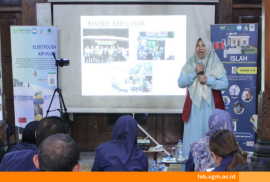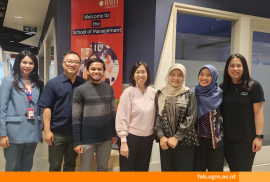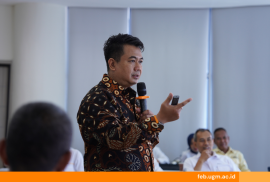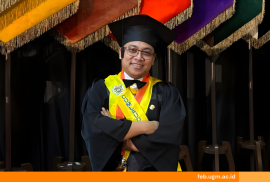The VPN team, consisting of accounting undergraduate students from the Faculty of Economics and Business UGM class of 2023, Vina Ashima Fibranawa and Nayla Phui Amazona, successfully won second place in the Sharia Essay Competition at the 14th Sharia Economic Activity (SEHATI) event organized by the Islamic Economics Study Group (KSEI) Universitas Diponegoro from September 10 to 12, 2024.
The VPN team won second place after competing against dozens of talented teams. Approximately 10-15 teams from universities across Indonesia participated in the competition.
Before being nominated as runner-up, the VPN team had to go through two rounds of competition. Participants were asked to write an essay in the preliminary round, which took place online in August. The top six teams then advanced to the final round, offline on September 10 and 11. The FEB UGM team and five other teams from Universitas Indonesia, Universitas Brawijaya, Universitas Padjajaran, Universitas Airlangga, and UIN Salatiga were selected to participate in the final round.
“In the final round, each team was asked to present the essay they had submitted in the preliminary round. After that, there was also a case study round where the committee provided the participants with a case to present to the judges,” Vina explained when contacted on Monday (September 23).
Vina further explained that in the finals, their team was given a case on the green economy with a sub-theme on the halal industry, specifically the issuance of sukuk or Sharia-compliant” bond for the halal industry, especially for MSMEs, developed by Sharia Securities Crowdfunding (SCF). Through this case, the team was asked questions about sukuk concepts, aspects of sukuk, what would happen if MSMEs preferred financing through Sharia shares, and the advantages of SCF financing over cooperatives or BMT.
Vina admitted that the VPN team’s journey to victory was not as easy as turning over a new leaf. During the finals, she and her team struggled, especially when confronted with a case study related to Sharia economics.
“Our background is in conventional economics, not Sharia economics, while the case we were given was about Sharia stocks and sukuk. This condition was challenging because we had to delve into Sharia economics and create a PowerPoint presentation in just one hour,” said Vina.
Most of the other teams had backgrounds in Sharia economics, which was an additional challenge for the VPN team.
Despite the difficulties and challenges, the VPN team ultimately proved that they deserved to be winners. They hope their success will inspire FEB UGM students to achieve and spark an interest in deepening their understanding of Sharia economics.
Reportage: Orie Priscylla Mapeda Lumalan
Editor: Kurnia Ekaptiningrum
Sustainable Development Goals









